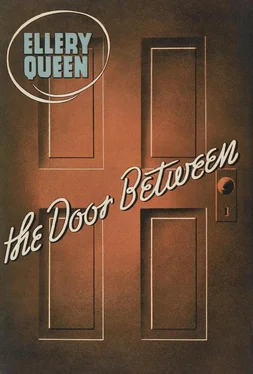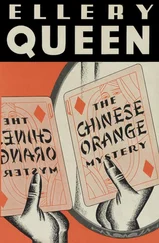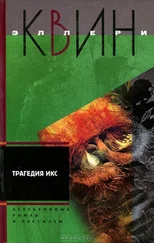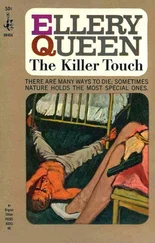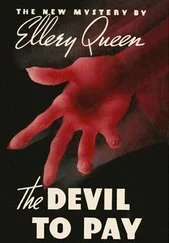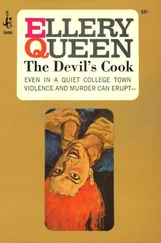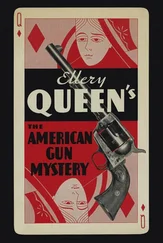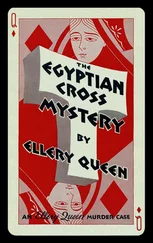Dr. MacClure shook his head and put his arm about Eva.
The Inspector shrugged. “Well, son, here’s the layout. Kept just as it was found, except for the body.”
Ellery’s nostrils were undulating a little. He gave only a glance to the sitting-room and went straight into the bedroom. They followed him in silence.
Ellery stood on the threshold and looked. He looked and looked without stirring. “Find the weapon?”
“Well... yes,” said the Inspector. “Yes, I think we have.”
Ellery glanced up at his coy tone and began to prowl. “By the way,” he said, looking through the writing-desk, “just how and why did Miss Leith call for a detective?”
“She phoned Headquarters around nine Sunday morning and asked to have a man sent over here at five o’clock Monday. Guilfoyle came and found her dead, with Miss MacClure and Terry here. As she didn’t say why, we’ll probably never know.”
Eva turned her face away. Everything the little old man said went through her like a knife.
“Are you sure,” asked Ellery, “it was Karen Leith who phoned?”
“The Japanese woman, Kinumé, was right here with her when she called up. Listen, Terry,” chuckled the Inspector, “why don’t you come clean? Give us a break.”
“I’m listening,” said Terry shortly.
“You phoned Karen Leith several times over last week-end — fact, you called her Sunday afternoon. O’Mara girl told me. What was your business with Miss Leith?”
“Who says it was business? You coppers give me a pain.”
Inspector Queen shrugged philosophically. He could wait. He had always been good at waiting... Ellery straightened up and fixed his gaze on the empty birdcage hanging near the low Japanese bed.
“Is that supposed to be symbolism, or was there really a bird in that cage?”
“I don’t know,” said the Inspector. “That’s the way we found it. Was it empty when you came in here Monday, Miss MacClure?”
“I really don’t remember.”
“It was empty,” snapped Terry.
“Oracularly spoken,” said Ellery. “Do you know anything about the bird that probably inhabits it, Doctor?”
“Very little. I’ve seen it around, that’s all. Some sort of Japanese bird that Karen brought back with her from Tokyo nine years ago. She was very much attached to it — gave it as much care as a child. Kinumé would know more about it; they came over together.”
The Inspector went out and Ellery resumed his leisurely inspection of the room. He did not glance once into the passage beyond the open attic door. He did look at the bolt, however. Dr. MacClure sat down on a queer little Japanese footstool and buried his face in his hands. Eva edged closer to Terry. There was something in the room that made talking difficult.
When the Inspector returned he was followed by Kinumé, who carried a second cage — different from the one hanging over the bed. There was a bird in the cage. The white maid, O’Mara, was behind Kinumé, stopping in the doorway and peering in with a stupid, avid, and yet fearful curiosity.
“What a beauty!” exclaimed Ellery, taking the cage from the Japanese woman. “You’re Kinumé; I remember. You are sorrowful that your mistress has been taken from you, Kinumé?”
The old woman lowered her eyes, still red from weeping. “This is evil thing, gentleman,” she muttered.
Ellery looked from her to the bird. The two seemed somehow to go together. There was something exotic about the creature, with its head, wings, and tail of purple and its purplish-chocolate body, with delicate hairlines of white on its throat. It had a strong beak, and from beak to tail it was about a foot long. It seemed to resent Ellery; it fixed its brilliant eyes on him, opened its beak, and emitted a harsh, ugly cry.
“Natural compensation,” remarked Ellery. “There had to be a touch of ugliness somewhere. Kinumé, what is the name of this bird?”
“ Kashi - dori ,” hissed Kinumé. “You saying — jay. Loo-choo kashi - dori . He come from my land. He old.”
“Loo-choo jay,” said Ellery thoughtfully. “He does look jayish. Why is he not in his cage in this room, Kinumé?”
“Sometime he here, sometime he downstairs. In other cage. In room of sun. He make noise at night. Missie no can sleep.” Kinumé hid her eyes in her kimono sleeves and wept. “Missie love. Missie love more’n anything. Missie take care all time.”
“I’ll say,” said the O’Mara girl unexpectedly from the doorway. Then, startled by the sound of her own voice, she looked around swiftly and began to retreat.
“Just a moment! What was that?” demanded Ellery.
She stopped, hesitated, began fingering her hair. “I didn’t say nothing,” she replied sullenly.
“But you did.”
“Well, she was crazy about that thing.” The girl began to edge towards the sitting-room door again, eyeing the Inspector.
“Come here,” said Ellery. “No one’s going to hurt you.”
“What’s all this fuss about a bird?” scowled the Inspector.
“No fuss at all. I’m just seeking information. What’s your name and how long have you been here?”
“Geneva O’Mara. Three weeks.” She was frightened now, and with a stupid perversity which seemed characteristic she was also ill-humored.
“Do you take care of this bird?”
“ She does. But I wasn’t here a week — she was sick—” she interpolated, pointing at Kinumé with Nordic scorn, “so I had to feed him his beef and egg and whozis, and the devil got out of the cage and flew into the backyard and we had a terrible time chasing him. He wouldn’t come down from the roof. I thought Miss Leith would throw a fit, she was that mad. She’d like to fire me on the spot. She was always firing her maids. Elsie told me — that’s the last one. All except her. ”
“You bad girl!” cried Kinumé, her slanted eyes flashing.
“You shut up!”
“Please,” said Dr. MacClure; and the white girl took fright again and fled. The Loo-choo jay squawked again. “Take the damned thing out of here,” said the doctor wearily.
“Birds,” said Terry Ring; he looked disgusted.
“You may go,” said Ellery to Kinumé; and she bowed humbly and took the caged bird away.
Ellery was just smoothing out the ball of Japanese stationery on the writing-desk when a fat little man in a crushed linen suit and carrying a briefcase bustled in, mopping his bald spot.
“I’m Morel,” he announced in a squeak. “Miss Leith’s lawyer. Hello, Inspector. Hello, Miss MacClure. Ah, tragedy. The work of some madman, no doubt. And you — I’ve seen your picture — Mr. Ellery Queen, of course.” He offered a wet hand.
“Yes,” said Ellery. “I think you know everyone, then, but Mr. Ring.”
“Mr. Ring,” said Morel, squinting. “How do.” Terry Ring looked at the wet hand. “Uh... now, Mr. Queen, just what—”
“Have you read this letter?”
“Yesterday. Odd that she didn’t finish it. Or perhaps not. Perhaps she was — I mean, before she could finish—” The lawyer coughed.
“Then who crumpled it?” said Terry Ring disdainfully.
Ellery glanced at him and then read the letter. It was written in a small, almost scientifically precise script, and it was dated Monday afternoon.
“Dear Morel:
“My records show that I have certain moneys outstanding in Europe in payment for foreign rights. The largest item is in Germany, as you know, chiefly because since the Nazi law went into effect German publishers may not send money out of the country. I want you to check over the whole list at once, thoroughly and completely — there’s something due from Spain, Italy, France, and Hungary on book royalties, and a few odd newspaper and serial items from Denmark, Sweden, and so on — and try to effect immediate payments . See if you can’t make some sort of reciprocal arrangement between Hardesty and Fertig; I understand a paper exchange of credits has been effected by some authors as between their English agents and German publishers.”
Читать дальше
